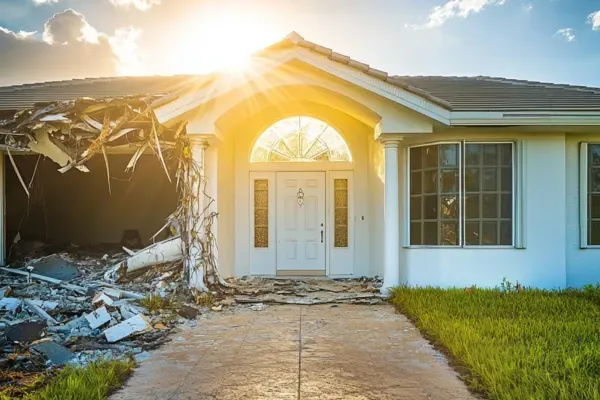
Understanding Caveat Emptor: Buyer Beware in Florida
Last Updated: May 27, 2025
Article By: Jared A.
When you hear the phrase caveat emptor, Latin for "buyer beware," it might stir feelings of caution, especially if you're navigating the complex world of real estate in Florida. We understand how overwhelming it can feel to purchase or sell a property while worrying about potential pitfalls like hidden property defects or undisclosed liens in Florida. The principle of caveat emptor places the responsibility on you, the buyer, to thoroughly investigate a property before committing, and that can feel like a daunting task. But you’re not alone—we’re here to guide you through this process with clarity, compassion, and actionable advice to help you protect yourself and make informed decisions. Whether you’re buying your first home or selling a property under pressure, our goal is to empower you with the knowledge and tools you need to navigate this journey with confidence.

Understanding Caveat Emptor in Florida Real Estate
The doctrine of caveat emptor has deep roots in property law, traditionally meaning that buyers must take responsibility for inspecting a property before purchase. In Florida, this principle still applies to many real estate transactions, particularly for "as-is" sales, where the seller isn’t obligated to disclose certain issues unless explicitly required by law. This can expose buyers to risks like title issues with Florida property, where liens or ownership disputes might not be immediately apparent, or even environmental concerns that could affect the property’s long-term value. For sellers, it underscores the importance of transparency to avoid disputes, especially in a market where buyers are increasingly cautious due to rising concerns about fraud and misrepresentation. Understanding this legal framework is the first step to protecting yourself, whether you’re entering the market as a buyer or looking to sell a property quickly.
At Florida Offer, we’ve spent over a decade helping homeowners and buyers across Florida, from Tampa to Venice, navigate these challenges with ease and confidence. Our team specializes in simplifying real estate transactions, often working with sellers who need to sell my house fast or buyers wary of as is home sale risks. We know how it feels to face uncertainty in real estate—whether it’s the fear of unexpected costs or the stress of legal complications—and our experience allows us to provide solutions that empower you. We’ve assisted countless families in overcoming hurdles like navigating complex title issues or managing the sale of a property in distress, ensuring they feel supported every step of the way. Our deep understanding of Florida’s real estate landscape makes us a trusted partner for anyone looking to buy or sell with peace of mind.
Common Risks Under Caveat Emptor
The buyer beware Florida law framework means you need to be proactive to avoid potential issues that could turn your dream home into a financial burden. Florida’s unique environment and real estate market present specific challenges that buyers must be aware of before signing on the dotted line. Here are some of the most common risks buyers face in Florida real estate, along with insights to help you prepare:
- Hidden Property Defects: Structural issues, mold, or pest infestations might not be visible during a casual walkthrough. For example, termite damage or foundation cracks can lurk beneath the surface, leading to costly repairs if not identified early. These issues can be particularly prevalent in older homes or properties that haven’t been well-maintained.
- Flood Zone Disclosure in Florida: Florida’s geography, with its low elevation and proximity to water, makes flood risks a significant concern. Some properties may be in high-risk zones, impacting insurance costs, safety, and even resale value. Failing to understand these risks can lead to unexpected expenses, especially during hurricane season.
- Unpermitted Renovations in Florida: Additions or changes made without proper permits can lead to fines, legal issues, or the need to redo work to meet code requirements. For instance, an unpermitted garage conversion might seem like a bonus, but it could become a liability if it doesn’t meet safety standards.
- HOA Disputes in Florida: Homeowners associations can impose unexpected fees, strict rules, or legal disputes that affect your ownership experience. A lack of clarity about HOA regulations can lead to conflicts over everything from landscaping to pet policies, creating stress for new homeowners.
According to a 2023 report by the Florida Realtors Association, nearly 15% of homebuyers in the state encountered unexpected issues post-purchase due to inadequate due diligence, with many citing undisclosed defects as a primary concern (Source: Florida Realtors, 2023 Annual Report). Additionally, a 2024 study by the National Association of Realtors found that 12% of buyers nationwide faced issues related to HOA disputes within the first year of ownership, a problem that’s especially prevalent in planned communities in Florida (Source: National Association of Realtors, 2024 Housing Trends). These statistics highlight why understanding caveat emptor is crucial for protecting your investment and ensuring a smooth transition into homeownership.
Before signing any contract, invest in a thorough home inspection to uncover hidden property defects. A qualified inspector can identify issues like foundation cracks, electrical faults, or water damage that might not be visible to the untrained eye, saving you from unexpected repair costs down the line.
Continued Below
Steps to Protect Yourself as a Buyer
Navigating the risks of caveat emptor doesn’t have to feel like an uphill battle, even if you’re new to the real estate market. By taking proactive steps, you can minimize surprises, avoid financial pitfalls, and make a confident purchase that aligns with your long-term goals. We know how it feels to be uncertain about such a significant investment, and we’re here to provide a clear path forward. Here’s a detailed checklist to guide you through the process and help you feel empowered:
- Conduct a Title Search: Work with a title company to uncover undisclosed liens in Florida or other title issues that could complicate your ownership. This ensures the property is free of legal encumbrances, such as unpaid taxes or creditor claims, that might surface after closing.
- Review Flood Zone Maps: Check if the property falls under a flood zone disclosure in Florida. The Federal Emergency Management Agency (FEMA) provides detailed maps to assess risk levels, and understanding these risks can help you budget for flood insurance or decide if the property is right for you.
- Verify Permits for Renovations: Ask the seller for documentation of any renovations to confirm there are no unpermitted renovations in Florida. You can also check with local building departments to ensure all work was properly permitted, avoiding potential fines or the need to redo non-compliant renovations.
- Research HOA Rules: If the property is part of a homeowners association, request a copy of the bylaws to avoid future HOA disputes in Florida. Look for details on fees, restrictions, and any ongoing disputes that might affect your lifestyle or budget.
- Get a Home Inspection: A comprehensive inspection can reveal structural issues, water damage, or other concerns that might affect your decision. This step is especially critical in Florida, where humidity and weather conditions can exacerbate problems like mold or roof damage.
- Consult with a Real Estate Attorney: If you’re unsure about any aspect of the transaction, a legal professional can review contracts, disclosures, and local laws to ensure you’re fully protected under buyer beware Florida law.
For example, a buyer in Clearwater recently avoided a major financial setback by discovering unpermitted electrical work during their due diligence. The issue was flagged during a home inspection, allowing them to negotiate with the seller to address the problem before closing. Similarly, another buyer in Lakeland used FEMA flood maps to realize their dream home was in a high-risk flood zone, prompting them to secure proper insurance and budget for potential mitigation measures. By addressing these steps, you can approach your purchase with greater peace of mind, knowing you’ve done everything possible to safeguard your investment.

Red Flags to Watch for in Florida Real Estate
Florida’s real estate market can be a treasure trove of opportunities, with its sunny weather and growing communities, but it’s also a hotspot for real estate scams in Florida. From fraudulent listings to misleading sellers, there are several red flags that should raise your caution as you navigate the market. We understand how disheartening it can be to encounter dishonesty when you’re trying to make one of the biggest decisions of your life, and we’re here to help you spot potential issues before they become problems. Here are some key warning signs to watch for:
- Unrealistic Pricing: If a property is priced significantly below market value, it might be a scam or hiding serious issues like foreclosure risks in Florida. While a deal might seem tempting, it’s often a sign of underlying problems that could cost you more in the long run.
- Lack of Documentation: Be wary of sellers who can’t provide clear records of ownership, repairs, or permits. Missing paperwork can indicate title issues with Florida property, such as disputes over ownership or liens that weren’t properly disclosed.
- Pressure to Skip Inspections: A seller pushing you to forgo due diligence might be hiding defects or legal issues. Inspections are your best defense against surprises, so never let anyone rush you into skipping this critical step.
- Vague HOA Information: Incomplete or evasive answers about HOA fees, rules, or ongoing disputes can lead to unexpected HOA disputes in Florida. For example, a buyer might discover post-purchase that the HOA has strict pet restrictions or a pending lawsuit that increases fees.
- Suspicious Seller Behavior: If a seller seems overly eager to close quickly without answering questions, it could be a sign of a scam or an attempt to conceal issues like past flood damage or structural problems.
Being aware of these warning signs can help you avoid costly mistakes and protect your financial future. If something feels off, trust your instincts and dig deeper before proceeding. For instance, a buyer in Largo recently backed out of a deal after noticing the seller’s reluctance to provide permit records for a recent addition, which turned out to be unpermitted and non-compliant with local codes. Taking the time to investigate saved them from a potential legal headache.
Partner with a trusted company that buys houses or a local agent familiar with Florida’s market. They can help you spot red flags, like real estate scams in Florida, and guide you through the process with expertise, ensuring you don’t fall victim to fraudulent practices.
The Role of Transparency in As-Is Sales
When a property is sold "as-is," the principle of caveat emptor becomes even more critical for both buyers and sellers. In Florida, as-is sales often appeal to sellers who want to sell fast house without investing in repairs, particularly if the property has known issues or the seller is facing financial constraints. However, this can increase the as is home sale risks for buyers, who must take extra care to uncover potential problems before committing. While sellers aren’t required to fix issues in an as-is sale, they must disclose known defects that materially affect the property’s value, such as flood history, structural damage, or major systems failures.
For buyers, understanding what "as-is" means empowers you to ask the right questions and conduct thorough inspections. This is especially important in Florida, where environmental factors like humidity, hurricanes, and flooding can exacerbate property issues. For example, a buyer purchasing an as-is home in Sarasota might need to investigate whether the roof has been properly maintained to withstand storm season or if there’s a history of water damage that wasn’t disclosed. On the seller’s side, transparency is key to avoiding legal disputes. Failing to disclose flood zone disclosure in Florida requirements, for instance, can lead to lawsuits from buyers who feel misled about the property’s condition or risks.
Transparency also benefits sellers by building trust with potential buyers, which can lead to a smoother transaction. In one case, a seller in Bradenton disclosed a history of minor flooding in their as-is listing, even though they weren’t legally required to do so. This honesty allowed the buyer to make an informed decision, and the sale closed without any disputes. By contrast, failing to disclose known issues can lead to post-sale conflicts, especially in a state like Florida, where buyers are increasingly aware of their rights and the importance of due diligence. Whether you’re buying or selling, approaching an as-is transaction with openness and thorough research can make the process less stressful for everyone involved.
How to Mitigate Risks When Selling Under Caveat Emptor
If you’re a seller in Florida, the caveat emptor principle can work in your favor by limiting your liability for certain repairs or issues, but it doesn’t absolve you of all responsibility. Florida law still requires you to disclose known material defects, and failing to do so can lead to legal challenges from buyers who feel misled. We know how stressful it can be to sell a property, especially if you’re dealing with financial pressures or a tight timeline, and we’re here to help you navigate this process with confidence. To protect yourself and ensure a smooth transaction, consider these strategies to mitigate risks and foster a positive experience for both you and the buyer:
- Disclose Known Issues: Be upfront about any defects, such as unpermitted renovations in Florida, to avoid future disputes with buyers. For example, if you know the property has an unpermitted addition or a history of roof leaks, sharing this information upfront can prevent misunderstandings and build trust with potential buyers.
- Provide Documentation: Share records of repairs, permits, and HOA agreements to demonstrate transparency and reduce the risk of HOA disputes in Florida. This might include receipts for recent HVAC maintenance, a copy of the property’s flood zone designation, or HOA meeting minutes that outline any upcoming assessments.
- Work with Professionals: Partner with a cash buyer for homes or real estate expert to streamline the process and ensure compliance with Florida laws. Professionals can help you navigate disclosure requirements, manage paperwork, and address any buyer concerns, making the sale process smoother and less stressful.
- Obtain a Pre-Sale Inspection: Consider hiring an inspector to identify potential issues before listing the property. This allows you to address minor problems or disclose them to buyers, reducing the likelihood of surprises during negotiations.
- Be Clear About the As-Is Nature: If you’re selling as-is, make sure the contract clearly states this to set proper expectations. This can help protect you from claims that you misrepresented the property’s condition.
For example, a seller in Apollo Beach avoided a potential lawsuit by disclosing a past flood incident, even though the property was sold as-is. The buyer appreciated the transparency and was able to secure flood insurance, resulting in a successful sale for both parties. In another case, a seller worked with a we buy houses company to sell a property with known structural issues, allowing them to avoid the hassle of repairs while still ensuring the buyer was fully informed. By taking these steps, you can minimize risks, build trust with buyers, and ensure a transaction that feels fair and straightforward.
Moving Forward with Confidence
The principle of caveat emptor reminds us that knowledge is power in real estate, whether you’re a buyer or a seller in Florida’s dynamic market. For buyers, being proactive about due diligence can help you avoid pitfalls like foreclosure risks in Florida, ensuring your investment is secure and your new home meets your expectations. This might mean taking extra time to review flood maps, verify permits, or negotiate with the seller to address issues before closing. For sellers, transparency and preparation can pave the way for a smooth sale, even if you’re looking to sell my home for cash under tight circumstances. By understanding your obligations and taking steps to protect yourself, you can avoid legal disputes and build trust with potential buyers.
At Florida Offer, we’ve helped countless clients overcome the challenges of buyer beware Florida law, and we’re committed to doing the same for you. We know how it feels to face uncertainty, whether you’re worried about hidden issues as a buyer or navigating the sale of a property with a complicated history. Our team has worked with buyers and sellers across Florida, from first-time homeowners to seasoned investors, and we bring a wealth of experience to every transaction. Whether you’re looking to sell quickly with a we buy homes solution or buy with confidence, we’re here to provide the guidance and support you need. With the right knowledge and a trusted partner by your side, you can turn a potentially stressful real estate transaction into a successful one, no matter where you are in Florida.
This article provides information based on the expert experience of our team at Florida Offer. For complex financial, legal, or regulatory matters related to real estate transactions, we recommend consulting a licensed professional, such as a CPA, real estate attorney, or appropriate government official, to ensure your specific needs are met.
More Topics for You:
Home Sellers Resources:
We Offer a Free Consultation. Find Answers Faster & Easier!
A Florida Offer Professional Will Call You
© 2026 Florida Offer. All rights reserved.






